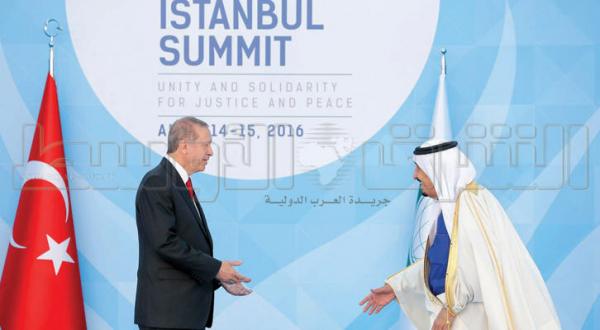The Custodian of the Two Holy Mosques King Salman bin Abdulaziz yesterday stressed that the discords, divisions, sectarian and religious strife and the use of armed militias in the Islamic world aims to destabilise security and stability, and requires us to take a serious stand to prevent such interferences and to maintain the safety and security of Islamic countries.
In his address to the Islamic summit which began in Istanbul, Turkey, yesterday, King Salman added that the leaders of Islamic states are required to tackle the issues of the Islamic community, starting with finding a just solution to the issue of Palestine according to Arab peace initiatives and international legitimate resolutions. The leaders must also end the Syrian crisis and support existing efforts to end the Libyan crisis.
The Islamic summit began yesterday with Turkey taking over the presidency of the thirteenth session of the OIC summit from Egypt, whilst Palestine, Djibouti and Burkina Faso will be vice presidents.
In the meantime, sources participating in the summit confirmed that all parties implicitly agreed upon the final statement scheduled to be released today. The sources added that Iran’s objections to the inclusion of its name in more than one item due to the fact that it is an “interfering” country in the internal affairs of Islamic countries, and the condemnation of the terrorist acts carried out by the Lebanese Hezbollah, did not prevent the acceptance of the statement as it appeared.
The sources confirmed that the Iranian delegation was forced to at least accept the statement after failing to find anyone to support its position. Only the Iranian delegation had reservations about adopting these paragraphs as the Lebanese side only had reservations about Hezbollah being condemned for supporting “terrorist groups that destabilise the security and stability of the organisation’s member states”. While no one objected to the items mentioning Iran, reservations about the items mentioning Hezbollah were expressed by Iran, Algeria and Indonesia; countries that have soldiers within the United Nations Interim Force in Lebanon (UNIFIL).
On the other hand, the draft that the leaders will pass today called for “good neighbourly relations” between Iran and its neighbours based on a non-interference policy in the internal affairs of states.
